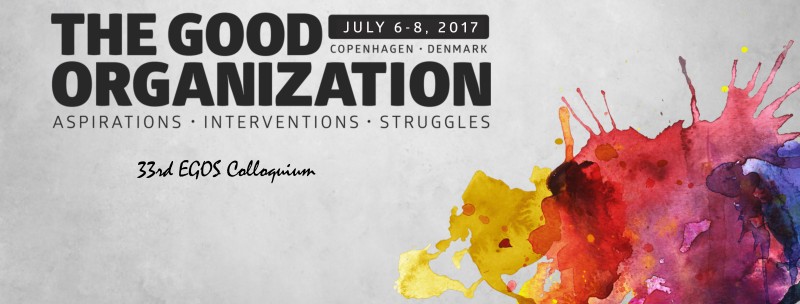Sub-theme 01: (SWG) Capitalism, Corporations and Society
Call for Papers
The global role of business in society has attracted a lot of research, focusing on themes such as corporate social responsibility
(CSR), sustainability, multi-stakeholder initiatives and business ethics. Although this broad stream of research has delivered
many important contributions, in this sub-theme we strive for the bigger picture and place these developments into a wider
context. We want to explore these business and society themes in the broader realm of corporations, capitalism and society
and examine how an organization studies perspective can contribute to these debates. We may have to rethink the role of corporations
in a capitalist society and examine what the systemic struggles, interventions and aspirations are to create “good“ organizations
in a changing society.
There is increasing concern that we are far apart from this ideal. Recent evidence
(e.g., the CSR Impact Project; Whiteman et al., 2013) suggests that what corporations practice in the name of concepts such
as CSR, corporate sustainability and business ethics has only had marginal effects on the overall socioeconomic fabric that
holds our contemporary society together. This raises the question whether the dominant neoliberal capitalist system poses
important constraints that make negative social, environmental and ethical externalities of corporate conduct unavoidable,
or might even systematically enable them. In fact, even the “low-hanging fruits” of CSR where a positive business case can
be relatively easily established, including classic issues such as workplace safety, emissions reductions, or diversity, still
remain subject to contestation. Most corporations don´t seem to be walking the talk, so to speak (Wickert et al., 2016). Moreover,
new or potentially more demanding issues such as human rights (Wettstein, 2012), labour exploitation and modern forms of slavery
(Crane, 2013), fraud and corruption, tax evasion (Muller & Kolk, 2012) and inequality (Fotaki & Prasad, 2015) seem
to be almost unsolvable within our current economic system.
In this sub-theme, we seek to stretch the boundaries
of what has previously been investigated under the umbrella of CSR and call for research that reconsiders the links between
corporations, capitalism and society, specifically focusing on the contributions organization studies has on offer. Decades
of CSR research and practice that remained within the current systemic constraints has had debatable impact on our ability
to advance humanity within planetary boundaries (Whiteman et al., 2013). This calls for questioning larger systemic issues
that seem to impose important constraints. Limits to CSR within capitalist systems and options for alternative economic forms
and rules are ripe for exploration, even if we avoid the more fundamental alternatives to capitalism, such as communism and
other political and economic forms of ordering. Within organization studies attention has for instance been paid to the identification
of pressing problems, institutional lenses on these problems, alternative modes of organization, and on varieties of capitalism
(Hall, 2001).
We argue that the domain of business and society urges organization scholars to look beyond
their current systemic boundaries and to explore alternative forms of organizing the business and society relationship, through
theoretical contributions, case studies, or empirical contributions. Questions to be addressed then include, but are not limited
to:
- What is the systemic nature of constraints that limit current forms of CSR to produce meaningful socioeconomic and environmental improvements and to what extent can these constraints be overcome?
- How to (re-)align capitalism, corporations and society? Which varieties of capitalism might offer more or less potential for such realignment?
- What alternative economic orders might overcome such systemic constraints, and what role can organizations and organization theory play in advancing such alternatives?
- What frameworks, models and theories might be useful in analyzing alternative economic orders with respect to CSR? Which new forms of empirical engagement seem useful?
- How could challenging problems such as labor exploitation or tax evasion be tackled through alternative economic orders? And what can be done within the present system?
- What contribution could organizational innovations such as new organizational forms (e.g. social enterprises), new legal forms (e.g. benefit corporations), and new social movements (e.g. Occupy) make to the realignment of capitalism, corporations and society?
- What institutions could enable a reshaping of capitalism and what role could institutional entrepreneurs play in advancing such change?
References
- Crane, A. (2013): “Modern Slavery as a Management Practice: Exploring the Conditions and Capabilities for Human Exploitation.” Academy of Management Review, 38, 49–69.
- CSR Impact Project (2013): Final Report Summary – IMPACT (Impact Measurement and Performance Analysis of CSR). http://cordis.europa.eu/result/rcn/149310_en.html, retrieved 17 November 2015.
- Fotaki, M., & Prasad, A. (2015): “Questioning Neoliberal Capitalism and Economic Inequality in Business Schools.” Academy of Management Learning & Education, 14, 556–575.
- Hall, P. (2015): Varieties of Capitalism. London: Wiley.
- Muller, A., & Kolk, A. (2012): “Responsible Tax as Corporate Social Responsibility: The Case of Multinational Enterprises and Effective Tax in India.” Business & Society, 54, 435–463.
- Wettstein, F. (2012): “CSR and the Debate on Business and Human Rights: Bridging the Great Divide.” Business Ethics Quarterly, 22, 739–770.
- Whiteman, G., Walker, B., & Perego, P. (2013): “Planetary Boundaries: Ecological Foundations for Corporate Sustainability.” Journal of Management Studies, 50, 307–336.
- Wickert, C., Scherer, A., & Spence,
L. (2016): “Walking and Talking Corporate Social Responsibility: Implications of Firm Size and Organizational Cost.” Journal
of Management Studies, DOI: 10.1111/joms.12209.


